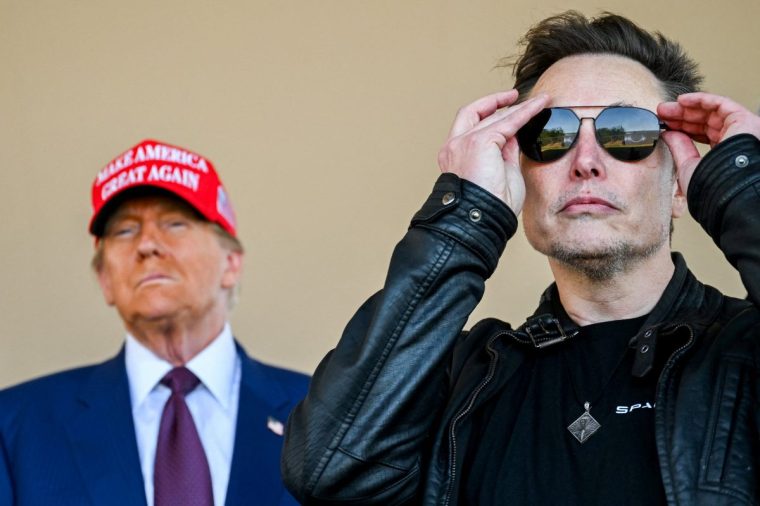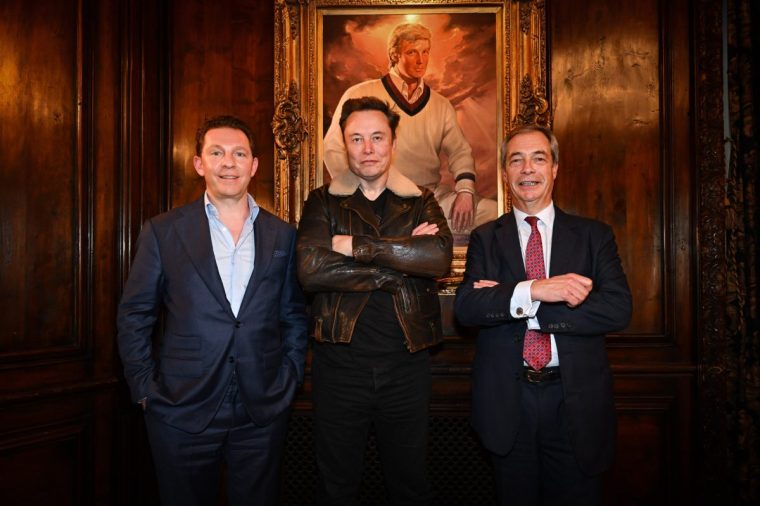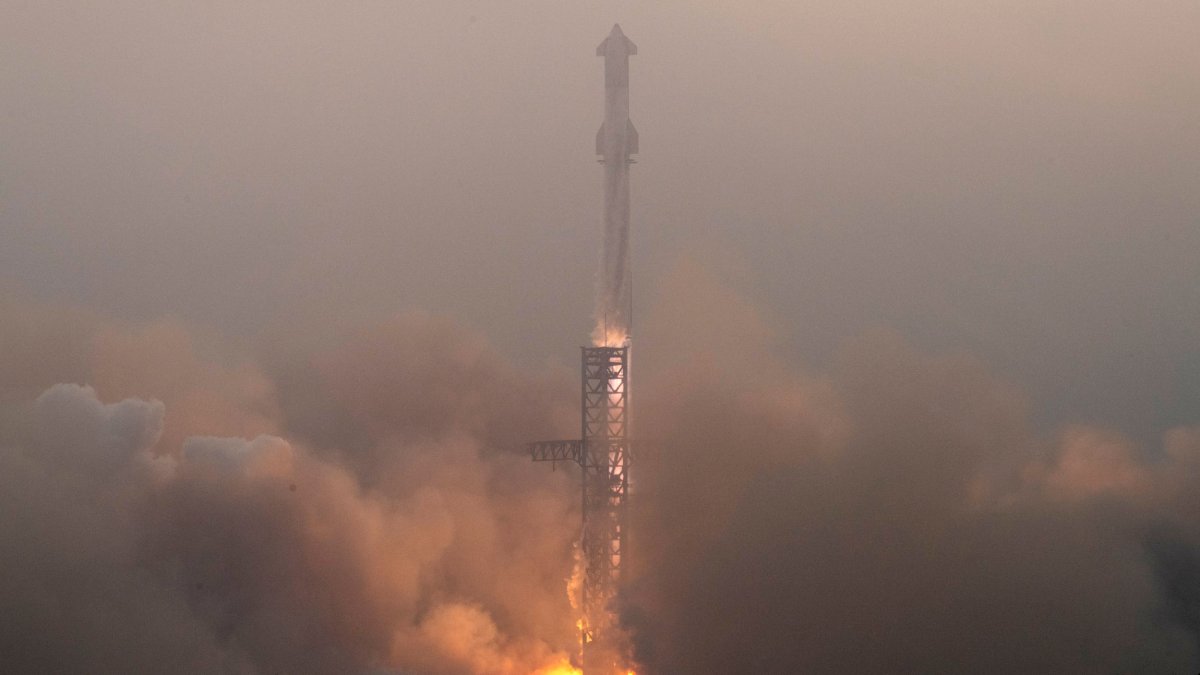With Musk’s new relationship to the White House, scientists predict a new ‘Kennedy moment’ is on the horizon – and Britain, China and Russia are watching
Elon Musk is not only the richest person on Earth – he will soon be the most powerful man in space as well.
On 20 January, he will take leadership of the newly-created department of government efficiency (Doge) that will be tasked with “restructuring federal agencies” such as Nasa – a move that one New York space professor told The i Paper could herald “a Kennedy moment” for space exploration.
The original Kennedy moment took place in 1961, when JFK challenged the US to land a man on the moon before the end of the decade – achieved in 1969.
This time around, the space watershed is expected to turbocharge the quest to reach and colonise Mars, as well returning humans to the Moon for the first time since 1972.
Space scientists point out that the president-elect Donald Trump made the unprecedented move of talking about commercial space in his acceptance speech, which they say indicates a heightened focus on space activities.
Meanwhile, the Doge role will give SpaceX chief executive Musk a chance to stamp his mark on Nasa, fundamentally changing the way it works and intensifying the focus on his – and Trump’s – ambitions for Mars.
“The impact will be enormous,” said Professor John Crassidis, of the University of Buffalo in New York – a former Nasa employee who still works with the agency and the US Air Force.
“Musk is a big proponent of space in general but has high hopes for getting us to the Moon and Mars.
“He already has a viable plan to get us to Mars and now having Trump’s ear, I truly believe that we are the closest we’ve ever been to make it a reality.”
Professor Andrew Coates, of University College London, meanwhile, is less sure about the impact Musk will have.
“We will have to wait and see but SpaceX is significantly reducing the cost of rocket launches through reusable boosters, which is both a great technical achievement and excellent news for the future of space.”
 US President-elect Donald Trump and Elon Musk (Photo: Brandon Bell/Reuters)Is Nasa being outsourced to SpaceX?
US President-elect Donald Trump and Elon Musk (Photo: Brandon Bell/Reuters)Is Nasa being outsourced to SpaceX?
While Nasa will not be disbanded it will effectively be outsourced to Musk’s SpaceX, scientists argue.
Professor Greg Autry of the University of Central Florida and Imperial College London told The i Paper in October that Musk’s new role will allow him to “rework the culture” at the space agency – a process that will be streamlined after Trump nominated a close collaborator of Musk to run it.
Assuming he is confirmed as the new Nasa head by the Senate, Jared Isaacman, a tech billionaire and space flight trailblazer, will help entrench a new culture that is expected to see bureaucracy, admin and regulations slashed and a much greater role for commercial enterprises like SpaceX.
“Isaacman will be in the driving seat to implement the commercial approach as Nasa head, potentially under Musk’s guidance,” said Professor Martin Barstow, of Leicester University.
Isaacman has twice travelled to space on private missions on SpaceX rockets and in September became the first non-professional astronaut to walk in space.
But the founder of the payment processing company Shift4 Payments lacks the experience which people in that role normally have, with the role typically filled by scientists, engineers, academics of public servants.
Michelle Hanlon, executive director of the Centre for Air and Space Law at the University of Mississippi School – and editor-in-chief of the Journal of Space Law – thinks Isaacman is “an inspired choice”.
“He has visibility, he is passionate and articulate and energetic,” she said.
“I think that he will put a focus on the use of commercial space services and help our space activities gain both in technological innovation and monetary efficiency.”
Some scientists say the expected transformation of space exploration Musk and Isaacman will kickstart could even see the the scrapping of the Nasa-led Artemis project to return humans to the moon, which had significant UK involvement, in favour of Musk’s Starship, the world’s most powerful launch vehicle ever developed.
“I think Starship will move into poll position for flying to the moon and Artemis might well be cancelled as a result. It is beginning to look like an unduly expensive investment. I see the commercial space market growing strongly under Musk,” said Professor Barstow.
In October the Starship rocket completed a world first after part of it was captured on its return to the launchpad.
The SpaceX vehicle’s lower half manoeuvred back beside its launch tower where it was caught in a giant pair of mechanical arms, as part of its fifth test flight.
This brings SpaceX’s ambition of developing a fully reusable and rapidly deployable rocket a big step closer.
Professor Crassidis added: “Isaacman does not fit the standard mould for Nasa Administrator. But maybe it’s time for some for something different. He is a dreamer and a person who isn’t afraid of anything. I have high hopes that he, like Musk, will have an enormous impact on the space race.”
Others are less enthused about the prospect of a fundamental change in the culture of space exploration.
Dr Andrea Calderaro, of Cardiff University, said: “Following decades of Nasa’s global leadership in space exploration, private companies are now playing an increasingly influential role. Elon Musk’s SpaceX is emerging as a dominant force, raising serious concerns about the future direction of space policy.
“This could potentially undermine international efforts to ensure space exploration remains equitable, secure, global and collaborative,” he said.
“And Isaacman’s close relationship with private industry raises valid concerns about conflicts of interest the the possibility of prioritising private ventures over public, science-driven objectives,” Dr Calderaro added.
A Nasa spokesperson said: “As the Department of Government Efficiency and Elon Musk’s appointment are both new, it wouldn’t be appropriate for Nasa to speculate on either role, including any impact on Nasa. We look forward to learning more as the new administration comes on board.”
 Elon Musk with Nigel Farage and Reform’s treasurer Nick Candy (Photo: Stuart Mitchell/Reform UK)Where do other space billionaires fit in?
Elon Musk with Nigel Farage and Reform’s treasurer Nick Candy (Photo: Stuart Mitchell/Reform UK)Where do other space billionaires fit in?
Aside for Musk, scientists do not generally take “space billionaires” very seriously.
“The space tourism industry is a bit of a sideshow really,” said Professor Andy Lawrence, of Edinburgh University.
Amazon founder Jeff Bezos, whose Blue Origin rocket company will be sending a pathfinder mission to the moon, is perhaps Musk’s most well-known rival in the billionaire space race.
In May, Blue Origin successfully launched six tourists into space and the company is aiming to send an un-crewed lander to the surface of the Moon by the end of 2025.
Kam Ghaffarian, who in February landed the first commercial spacecraft on the moon, is another one to watch, some say.
Unlike Bezos, Ghaffarian, who emigrated to the US from Iran, has made most of his fortune from space businesses.
These have sent the first commercial spacecraft to the moon (Intuitive Machines in February), while another is building a space station to put in orbit around the Earth (Axiom Space) and another designing advanced nuclear reactors (X-Energy).
While many scientists believe the pool of useful space billionaires is limited, Dr Hanlon thinks the more the merrier.
“Space needs all the billionaires it can get. Competition is important,” she said.
How likely is it that humans will colonise Mars – and when?
Musk plans to launch five un-crewed Starships to Mars for the first time in just two years. And if those flights go well, he said the first human crews would follow four years from now – both goals regarded as hugely ambitious.
Following that, he has predicted that in about 20 years, one million people will be living on Mars – a target widely regarded as considerably more ambitious still.
There are still a lot of technical hurdles to overcome before can get to Mars – such as the sheer distance and incredibly high radiation levels – let alone live there. Nasa doesn’t expect to land humans on Mars until the 2040s.
And when they arrive they will have to contend with icy temperatures, dust storms and air that is impossible to breathe.
“I think this is a long way off,” Professor Barstow said. “Mars is almost as inhospitable as the Moon, but also very long way from Earth – about eight months away. There is much underestimation of the scale of the problem by everyone.
“There is also the question – should we? Scientifically, we are trying to discover if there was or is life on Mars. Humans tramping around on the surface will contaminate the planet and we then might never be able to answer that question properly.”
The pros and cons of Musk’s Starlink internet service
Starlink is a satellite-based internet service that provides high-speed broadband access to almost anywhere on the planet through close to 7,000 satellites orbiting low around 550km from Earth.
The satellites communicate with ground transceivers, which are connected to fibre-optic networks. Users can access the internet through satellite antennas mounted on their buildings or portable antennas
Scientists are impressed by the number of customers Starlink has, mushrooming from one million subscribers to over four million in just two years, such as armies, telecom companies, airlines, cruise lines and maritime shippers.
But they are concerned about the possibility of more debris – from crashes – and light pollution – although they point out that Musk has done things to mitigate both though.
For example, Starlink satellites have an automated capability to avoid collisions with other objects – and they have already maneuvered 50,000 times to avoid collisions with spacecraft, debris and other satellites in just a six-month period in 2024.
And Starlink has taken steps to reduce light pollution, such as putting a a dark coating on one side to reduce its reflective brightness and using sun visors to cut the glare.
Scientists are also concerned about this incredibly powerful system being controlled by just one person.
“A notable example is Musk’s decision to withdraw Starlink services from Ukraine, highlighting the dangers of dependency on a single provider,” said Dr Calderaro.
What role are Britain, China and Russia playing in the space race?
Although Britain is a relatively small player in space exploration, scientists say it does have a role to play due to its association with Nasa – although how this may change in the coming years is unclear.
It is also involved in space science missions through its affiliation with the European space Agency.
“The UK is very much within the Nasa fold, and the Artemis [Moon] accords are a way of building a ‘Western’ approach around Nasa,” said Professor Barstow.
He adds: “Russia is pretty weak in space right now, so I don’t think they are competitive in establishing a presence on the Moon. China certainly have that ambition and will get there, but their approach is slow and steady building up capability to ensure success.”
Professor Crassidis said: “I think we’re nearing a ‘Kennedy moment’. All these countries have aspirations to go to the Moon and then to Mars. China already launched several lunar missions.
“Their Change-4 lander was the first mission to land on the far side of the Moon. They have aspirations to put humans on the Moon around 2030. This is a good thing. The US will certainly beat them to the Moon, but then the race to Mars begins,” he said.
